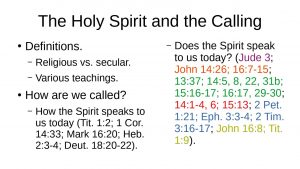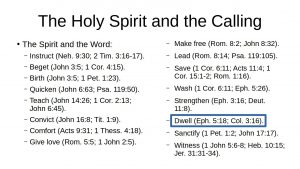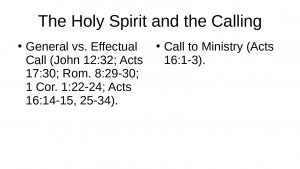Denominational Doctrines
§1. The Calling
Religious vs. secular.
Many professionals feel as though their job is their calling.
This is an emotional reaction to how they feel about their job.
They love doing it and are really good at it.
I hear this especially describing teachers, doctors, and other healthcare professionals.
Some would even do it for free if they could survive.
This is a secular calling, though some may attribute this to what God wants them to do with their lives.
Maybe it is. This is a subjective thing and difficult to prove one way or the other.
This will be a theme as we consider this concept.
Different denominations.
It may surprise you to learn that different denominations have different ideas about a religious calling.
The two we are going to focus on this evening is the call to salvation and the call to the ministry.
Calvinists (Presbyterians and some Baptists) will distinguish between two calls when it comes to our salvation: general and effectual.
Nearly all of them believe you have to have some special calling to join the ministry, something above and beyond the secular calling, as if the Holy Spirit is telling you this directly.
How are we called?
How the Spirit speaks to us today.
In order to understand the calling that the denominations teach vs. what the Bible teaches, we must understand how the Spirit speaks today.
Many denominations teach that the Spirit speaks to men directly today whether by their direct knowledge or not.
There are several problems with this notion.
What happens when two people claim to have received a message from the Spirit and they contradict—because it does happen!
Will the Lord tell you something different about the meaning of a passage of Scripture than He would tell me? Not if He’s the same God. Not unless He’s lying or the author of confusion.
Yet we find in Scripture plain teaching that He is not a liar nor is He the author of confusion (Tit. 1:2; 1 Cor. 14:33).
In any testable way, we cannot confirm whether or not the Spirit speaks to you directly.
On top of that, there is no way for someone to distinguish between what they personally feel vs. what the Spirit is telling them.
When I was in my old denomination, I felt called to go speak to someone during the altar call. He was sitting down and looked pensive like something was on his mind. When I talked with him I asked if he needed to talk. I was convinced the Spirit wanted me to ask that, you see. He looked confused and said, “No, I’m good.”
And I wonder how many times someone is convinced the Spirit is speaking to them before it works out like they expect.
If it’s trial and error, that’s not the Spirit, that’s just you.
And maybe you just have good intuition, maybe you don’t.
You see, the way people could tell back then if the Spirit spoke to them was if there was a miracle to confirm it (Mark 16:20; Heb. 2:3-4).
And if you ever make a wrong prediction, what does the OT say must happen to you? (Deut. 18:20-22).
I’m not suggesting the death penalty for those who have spoken falsely today, but it does show the seriousness of the infraction.
So does the Spirit speak to us today? Yes…. and no.
First, the Lord does not reveal any new doctrines (Jude 3).
What was true 2000 years ago is still true today. What was required of mankind 2000 years ago is still required today.
That’s why coming up with something new doctrinally speaking can be extremely dangerous—if it’s new, it’s false!
Second, the Spirit spoke to the Apostles (John 14:26; 16:7-15).
People will assume this passage is speaking about them, but fail to consider the context.
Everything in John 14–16 is in reference to the Eleven (John 13:37; 14:5, 8, 22, 31b; 15:26-27; 16:17, 29-30).
Now, there are some universal things in there that we might be able to extend to every believer, but you need a compelling reason to do so (e.g. John 14:1-4, 6; 15:13).
So the Spirit was to teach them all things and help them to remember everything He said, guiding them into all truth.
And they guide us into all truth by writing that truth down (2 Pet. 1:21; Eph. 3:3-4).
The Bible is all we need today in matters religious, spiritual, moral, and ethical (2 Tim. 3:16-17).
Third, the Spirit speaks to us today through the Word He inspired.
So the Spirit does indeed “convict the world of sin” through the Word He inspired (John 16:8; Titus 1:9).
When you hear a sermon or listen to a hymn or study a passage and you get a burden on your heart to act upon it, is that not the Holy Spirit convicting you in some way?
It is! But how did that happen? Through the Word He inspired.
The sermons and hymns are based on Bible passages and teachings that the Spirit illuminated for us no less than 2000 years ago.
Assuming the Spirit speaks to us directly today implies that the Bible is not all-sufficient, which denies 2 Tim. 3:16-17.
Instruct (Neh. 9:30; 2 Tim. 3:16-17).
Beget (John 3:5; 1 Cor. 4:15).
Birth (John 3:5; 1 Pet. 1:23).
Quicken (John 6:63; Psa. 119:50).
Teach (John 14:26; 1 Cor. 2:13; John 6:45).
Convict (John 16:8; Tit. 1:9).
Comfort (Acts 9:31; 1 Thess. 4:18).
Give love (Rom. 5:5; 1 John 2:5).
Make free (Rom. 8:2; John 8:32).
Lead (Rom. 8:14; Psa. 119:105).
Save (1 Cor. 6:11; Acts 11:14; 1 Cor. 15:1-2; Rom. 1:16).
Wash (1 Cor. 6:11; Eph. 5:26).
Strengthen (Eph. 3:16; Deut. 11:8).
Dwell (Eph. 5:18; Col. 3:16).
Sanctify (1 Pet. 1:2; John 17:17).
Witness (1 John 5:6-8; Heb. 10:15; Jer. 31:31-34).
So how does the Spirit call us?
Through the Word!
This makes any calling we might receive general.
Calvinists will distinguish, saying that some are called (general call), but few are chosen (effectual call).
This is how they try to reconcile passages that say that everyone is called (John 12:32; Acts 17:30), but only the justified/saved are called (Rom. 8:29-30; 1 Cor. 1:22-24).
The thing is, the only way those two are different, is that one refers to all men being called while the other refers to those who answered the call.
The call of salvation has been given to all people.
So why do they believe otherwise?
Saul of Tarsus – he received a great experience that caused him to believe.
You see, they treat as normative the experience of this one individual who would later become an Apostle of Jesus Christ.
Did Lydia feel some special calling when she became a Christian? (Acts 16:14-15).
What about the Philippian jailer? (Acts 16:25-34).
No, they heard the word of God preached by Paul.
This is the same for every “normal” conversion moment.
Call to the Ministry.
They do the same when it comes to become a minister of Jesus Christ.
They look at the account of Saul of Tarsus and treat it as normative.
He had a great experience where Jesus calls him to the ministry, so must everyone else.
Did Timothy? (Acts 16:1-3).
Did Silas or Barnabas?
I have no problem with someone saying that it felt like a calling in a non-miraculous sense, but to say the Holy Spirit came to you directly to let you know you need to become a minister is downright foolhardy and arrogant.
I do this because I want to see souls saved, and I feel I could be of some service to my Lord to that end, and He has given me some talents that I intend to use for His service, all for His glory.


